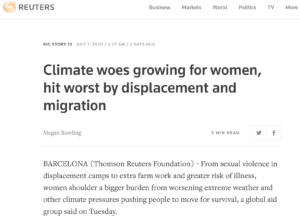Via Climate Nexus:
Women Harmed Most By Climate Change: Women bear a disproportionate share of harms caused by climate change, especially those stemming from forced displacement due to extreme weather and other climate pressures, according to a new report. The CARE International report found climate-fueled cyclones, droughts, flooding and other large-scale climate disasters force people into overcrowded camps and shelters, where women are targets of sexual violence. In one example cited in the “Evicted by Climate Change” report, women and girls displaced by Cyclone Idai, which hit Mozambique, Zimbabwe and Malawi in 2019, continue to face serious health threats because they lack access to basic services and sanitary products. “Climate change exacerbates existing gender inequalities, with women displaced on the frontlines of its impacts bearing the heaviest consequences,” CARE Secretary General Sofia Sprechmann Sineiro told Reuters. (Reuters; Climate Signals background: Drought Risk, Intense Cyclone, Hurricane, Typhoon Frequency Increase; Commentary: Thomson Reuters Foundation)
Reuters: “Climate woes growing for women, hit worst by displacement and migration”
(Thomson Reuters Foundation) – From sexual violence in displacement camps to extra farm work and greater risk of illness, women shoulder a bigger burden from worsening extreme weather and other climate pressures pushing people to move for survival, a global aid group said on Tuesday.
Scientists expect forced displacement to be one of the most common and damaging effects on vulnerable people if global warming is not limited to an internationally agreed aim of 1.5 degrees Celsius, CARE International noted in a new report.
“This report shows us that climate change exacerbates existing gender inequalities, with women displaced on the frontlines of its impacts bearing the heaviest consequences,” said CARE Secretary General Sofia Sprechmann Sineiro.
For example, women and girls uprooted by Cyclone Idai, which hit Mozambique, Zimbabwe and Malawi in 2019, are still facing serious health threats due to poor access to basic services and sanitary products, the report said.
And in Ethiopia, where about 200,000 people were forced from their homes last year by drought and floods, women living in overcrowded shelters face higher levels of sexual violence there and on longer, more frequent trips to fetch water and firewood.
Sven Harmeling, CARE’s global policy lead on climate change and resilience, said displacement linked to climate stresses was already “a harsh reality for millions of people today”.
If global warming continues at its current pace towards 3C or more above pre-industrial times, “the situation may irrevocably escalate and evict hundreds of millions more from their homes”, he added.



